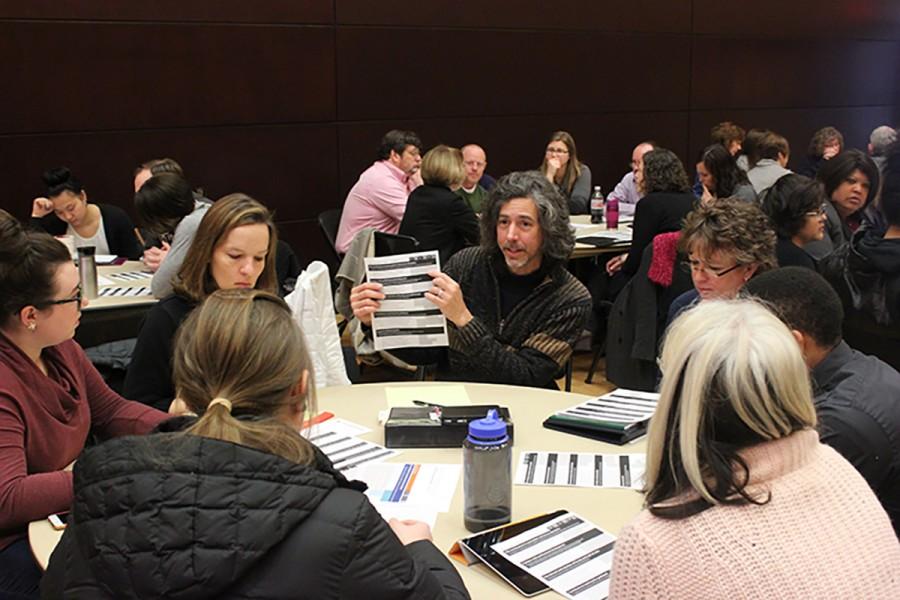Chancellor hosts forum to discuss diversity shortcomings
Students express reservations regarding the proposals made by the EDI Team and forum participants
Photo by Gabriel Lagarde
Participants in the EDI Forum formed groups of six to eight at each table to meet and discuss potential solutions for issues of equity, diversity and inclusivity on campus.
March 10, 2016
Chancellor James C. Schmidt and members of the university’s Equity, Diversity and Inclusivity Implementation Team conducted a forum with faculty, students and members of the community to suggest and evaluate proposals for fostering EDI principles on campus during a meeting Friday in the Ojibwe Ballroom.
The two co-leaders of the team, David Jones, professor of English, and Ann Rupnow, professor of marketing, asked roughly 200 participants to formulate plans to meet five mission goals outlined by the team to increase enrollment of students of color and confront the opportunity gap minorities face on campus.
While there had been a ten-year plan in place to increase minority enrollment to 20 percent, the 23 members of the EDI Implementation Team also outlined a two-year plan starting this spring to alleviate the opportunity gap in the Eau Claire area, Jones said.
By creating an environment that is supportive, increases retention rates and promotes involvement in high impact practices for minority students — internships, study abroad, music programs, the honor programs and other university organizations — minorities aren’t only more likely to enroll in UW-Eau Claire, they’re more likely to stay enrolled and benefit from the institution, the chancellor said.
Schmidt stressed to forum participants that the changes are intended to have a substantial and lasting impact on the university and surrounding communities.
“I’ve seen lip service around issues of (diversity) my whole career,” he said. “I have very low tolerance for it. This is not about political correctness.”
Groups of six to eight participants held discussions for 30 minutes to propose suggestions, which they presented to the EDI Implementation Team. These include the following:
– Maintaining high standards and structure for faculty and students to promote diversity and inclusivity.
– Strong responses to violators, much in the vein of classes for underage drinking offenders.
– Increased representation of minority faculty. Discussion participants cited lack of minority applicants.
– A potential initiative to recruit and educate local minority leaders within the community to contribute to the EDI initiative.
– Increasing student senate participation in the process.
– Appointing an official to oversee and appraise the progress of the two-year, 10-year and 20-year variants of the EDI plan.
– Increasing collaboration and participation with the local community to meet plan goals.
– Faculty evaluations to include lines of inquiry regarding performance and the promotion of EDI principles in classroom settings.
– Educating students on the concepts of racism, unintended discrimination and the impact of these societal phenomena.
During the feedback period, Associate Athletics Director Robin Baker said for meaningful improvements to occur, the plan must extend beyond institutional initiatives and influence the culture of the campus. It requires active participation from the faculty, she said.
“Once we acknowledge we need to step outside our comfort zone, we can move towards progress,” Baker said. “In order for us to be leaders for these students, we have to step out of our comfort zone.”
Schmidt said as a result of the budget cuts there are limited resources in place for the EDI plan.
The EDI Implementation Team will make “careful investments” in order to promote diversity with the resources available and the university prioritized these goals from the onset of the budget cuts, he said.
Ashley Sukhu, Student Senate’s inclusivity coordinator and a member of the EDI Implementation Team, said the improvements the team intends to enact are difficult to gauge and will potentially take decades to fully develop.
“While I have felt like these changes are slow moving, I still think they’re necessary,” she said. “I think it will be 10 or maybe 15 years before I see the changes I want to see.”
Alejandra Estrada, a sophomore public history student, said she doubts the plans proposed by the EDI Implementation team will work effectively as they don’t adequately address widespread misconceptions and ignorance among the faculty and students regarding racism and the issues minorities face on campus and in the Chippewa Valley.
Mandatory multicultural education for students and faculty is the best way to counteract this, she said.
“Public programming is so important when people don’t have a common understanding of what racism is,” Estrada said. “Ignorance is what makes our community hostile.”
While the issues of diversity and equal opportunities are complex and difficult to confront, the struggle is an important part of the charter of UW-Eau Claire and an integral part of secondary education, Schmidt said.
“If people don’t believe universities are where we improve society,” he said, “then we should close the books, because we aren’t needed.”

